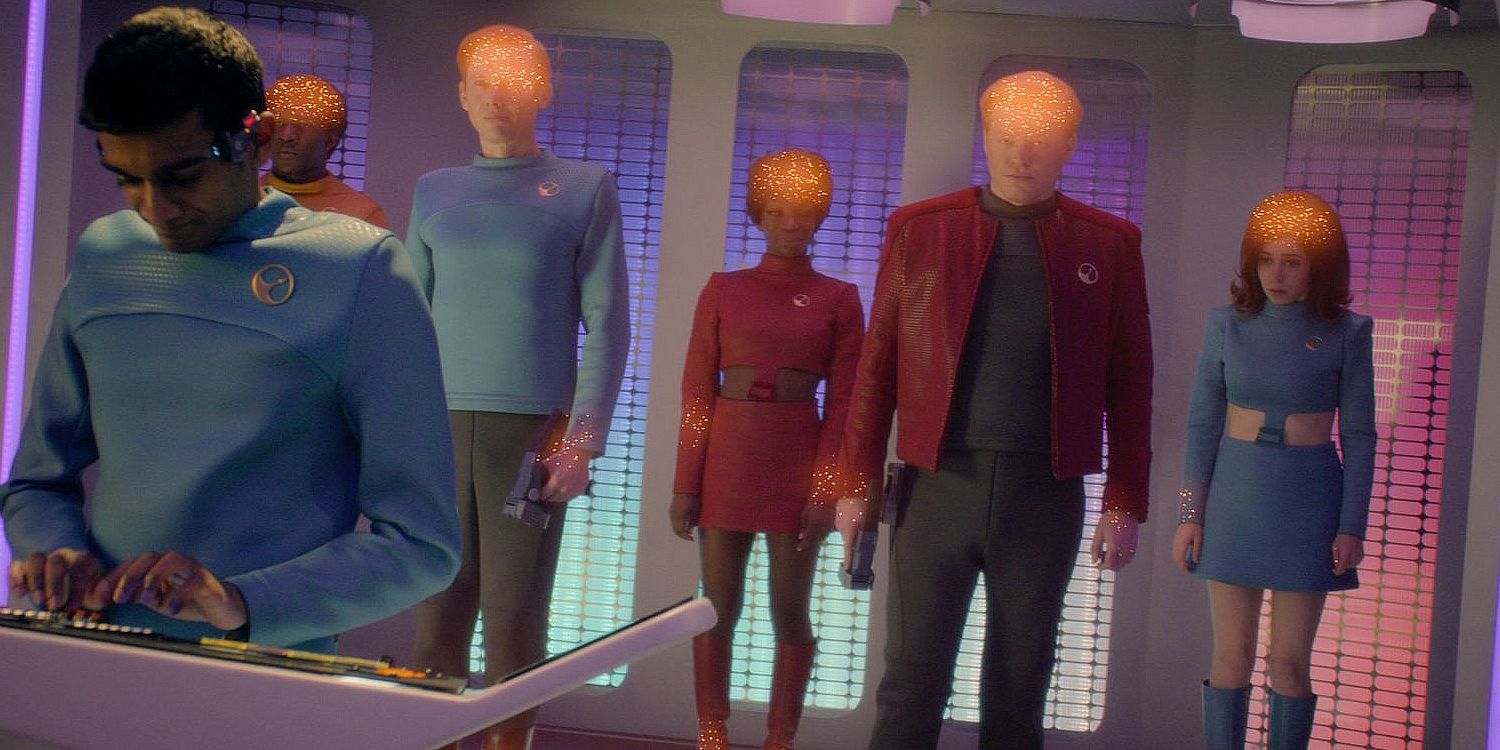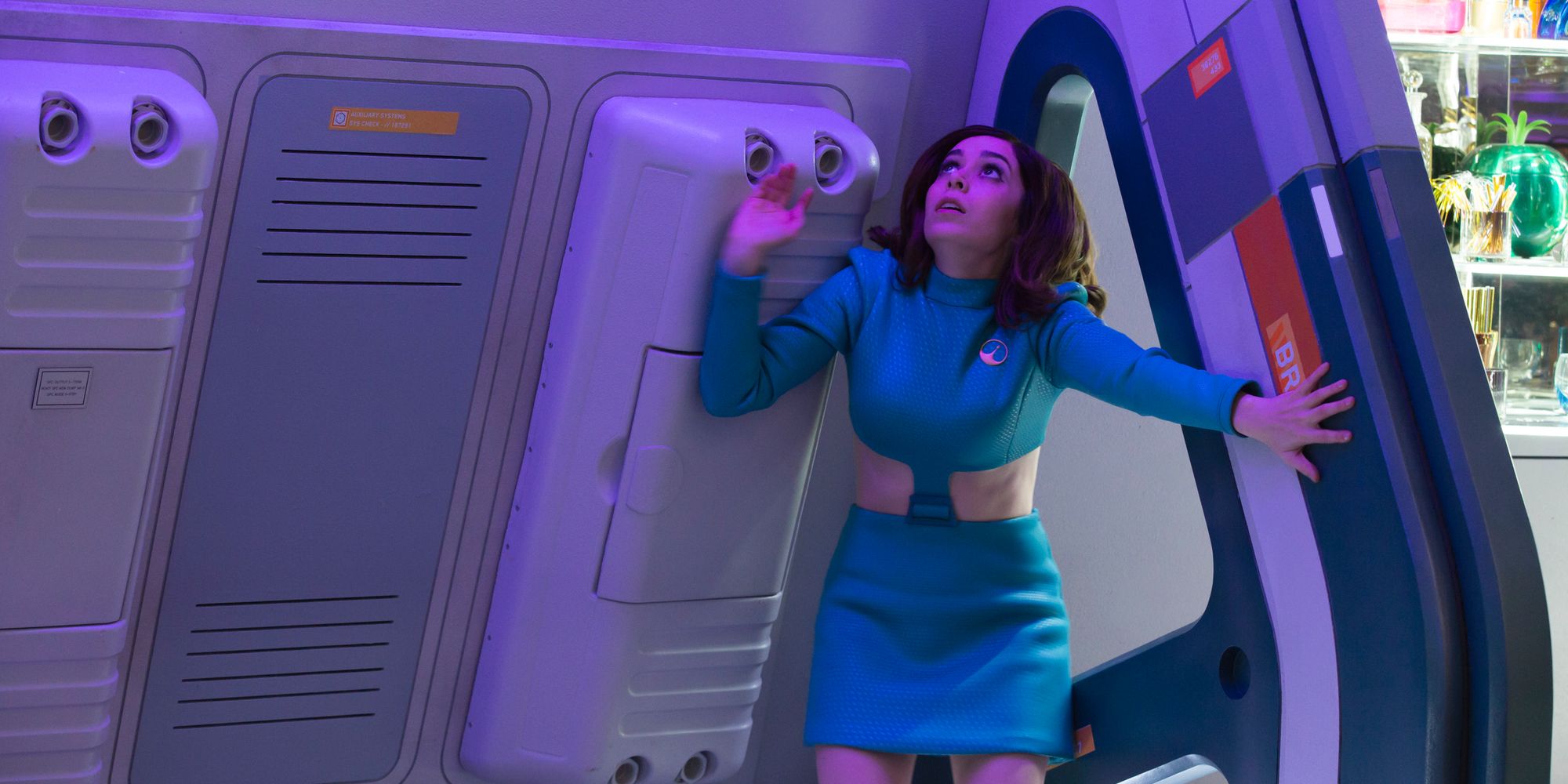‘USS Callister’ is the standout of the new Black Mirror season 4 episodes, but not because it does a killer spoof on Star Trek and star Jesse Plemons does a strong riff on William Shattner’s James T. Kirk. Instead, it’s because the episode flips the script on its own premise multiple times, until it begins to flip the script on the usual Black Mirror format, upending and expanding upon what viewers have come to expect from the series.
Perhaps one of the most ambitious episodes of Charlie Brooker’s technophobic nightmare, ‘USS Callister’ is a genre mash-up that’s part Star Trek, part Galaxy Quest, and part thriller. It runs longer than the usual episode, about 76 minutes in total, but unlike most extra-long episodes of television, it mostly justifies the extended runtime by first setting up a somewhat traditional Black Mirror-esque story about Plemons’ Robert Daly, a socially awkward tech genius who is unappreciated and disrespected at the revolutionary virtual reality company he co-founded alongside Jimmi Simpson’s character. The story initially suggests a familiar exploration of the addictive nature of video games and technology, and how both can often feel like they offer something more real and comforting than what's available in the real world. That’s all well and good for a Black Mirror episode; it’s pretty much what we’ve come to expect from the series and its often repetitive, somewhat scold-y storylines. But just when you think you know where the episode is headed, it boldly goes somewhere unexpected, and ends up providing a potential new template for a series whose formula has begun to feel a little stale.
Related: Black Mirror: Did You Catch USS Callister’s TWO Major Cameos?
Co-written by Brooker and William Bridges, ‘USS Callister’ becomes so many different things over the course of its runtime that it easily becomes the best of the new bunch. Plemons’ Daly isn’t the sad sack office drone he first appears to be, nor is he the quiet geek, obsessed with a wholesome and chaste sci-fi television series called Space Fleet. After a quick introduction, it’s soon revealed that he’s a megalomaniacal monster who’s trapped digital clones of his co-workers in a modified version of the game Infinity, which he helped create. The catch, however, is that the digital clones are actually sentient code, fully aware of the person they used to be on the outside and stuck in a never-ending torture chamber Simpson’s character describes as a “Bubble universe ruled by an asshole god.” The kicker, though, is when Cristin Milioti’s Nanette Cole arrives at work and quickly becomes an object of affection for Daly. He creepily swipes her DNA and presto, there’s a copy of Nanette in his private bubble universe.
From there, the episode becomes a wild mash-up that’s sometimes a thriller, sometimes an escape-from-prison/heist story, and sometimes a surprisingly effective space adventure. But inside all of that, ‘USS Callister’ also manages to afford the series its requisite commentary, this time on things like the aggrieved male (whose own sense of entitlement convinces him he’s the victim), the ever dwindling notion of privacy (at one point, Milioti’s character blackmails herself by threatening to release nude photos online), power dynamics in a toxic workplace, and the enormous sway that technology companies have over people’s everyday lives.
Unlike other episodes of the series and even those in season 4, ‘Callister’ doesn’t stop at its twist or, as is more often the case with Black Mirror, at its depiction of technology gone awry. Instead, it develops into a more fully realized world and scenario where the characters’ fraught relationship with technology is more deeply explored, which not only expands the horror, but also allows for the characters themselves to surprise us and for the episode to introduce some genuinely funny moments that go well beyond taking a jab at Star Trek. The surface-level sexlessness of the Daly’s virtual co-workers isn’t just a funny sight gag or the chance for Nanette to deliver the episode’s single best line; it also provides additional insight into Daly’s character that’s unnerving in its obsession with not only a relic from a bygone era of popular culture, but also that era's outmoded social norms. The result, then, is a multi-layered sci-fi story that relies much more on the complexities of its human characters than the fantastical tech fueling its plot.
Ultimately, ‘USS Callister’ is the rare Black Mirror episode where the whole is greater than the sum of its parts. Rather than become another finger-wagging lecture on the perils of technology and a life lived online it flips the script one last time to actually become a solid homage to Star Trek, one where the plot contains a multitude of direct and indirect representations capable of hold different meanings for different viewers. But perhaps what’s most impressive about ‘Callister’ is its willingness to step outside the typical Black Mirror box, and for it to demonstrate how the series can continue to grow and expand beyond the familiar bleak cynicism and “gotcha!” moments that so often mark the show's individual installments. From a purely structural standpoint, ‘USS Callister’ is a standout episode. It is funny and thrilling; but more importantly, it opens up a whole new world of possibilities for the series that changes its formula for the better.
Next: 2017-2018 Winter TV Premiere Dates: New & Returning Shows to Watch
Black Mirror season 4 is currently streaming in its entirety on Netflix.


